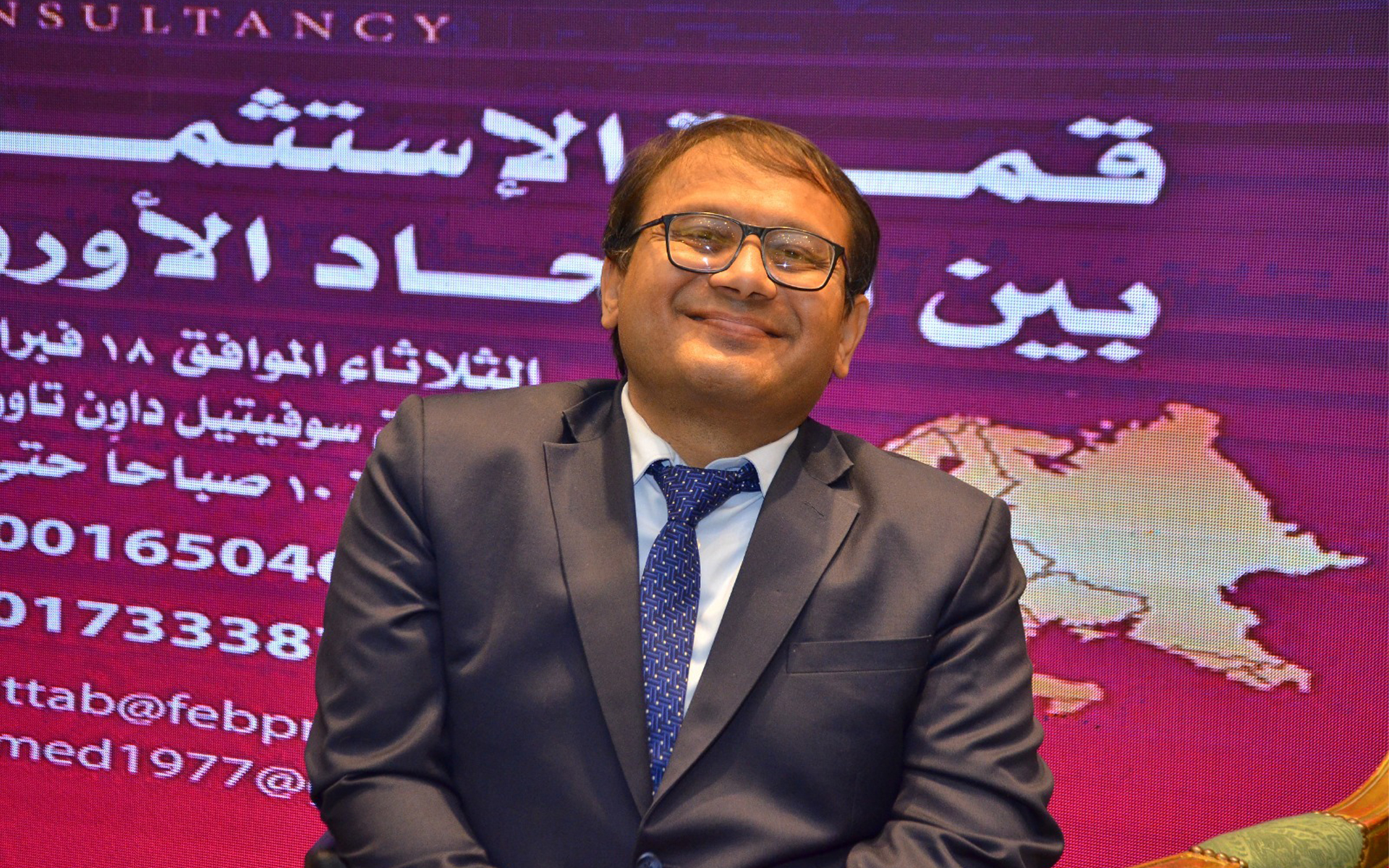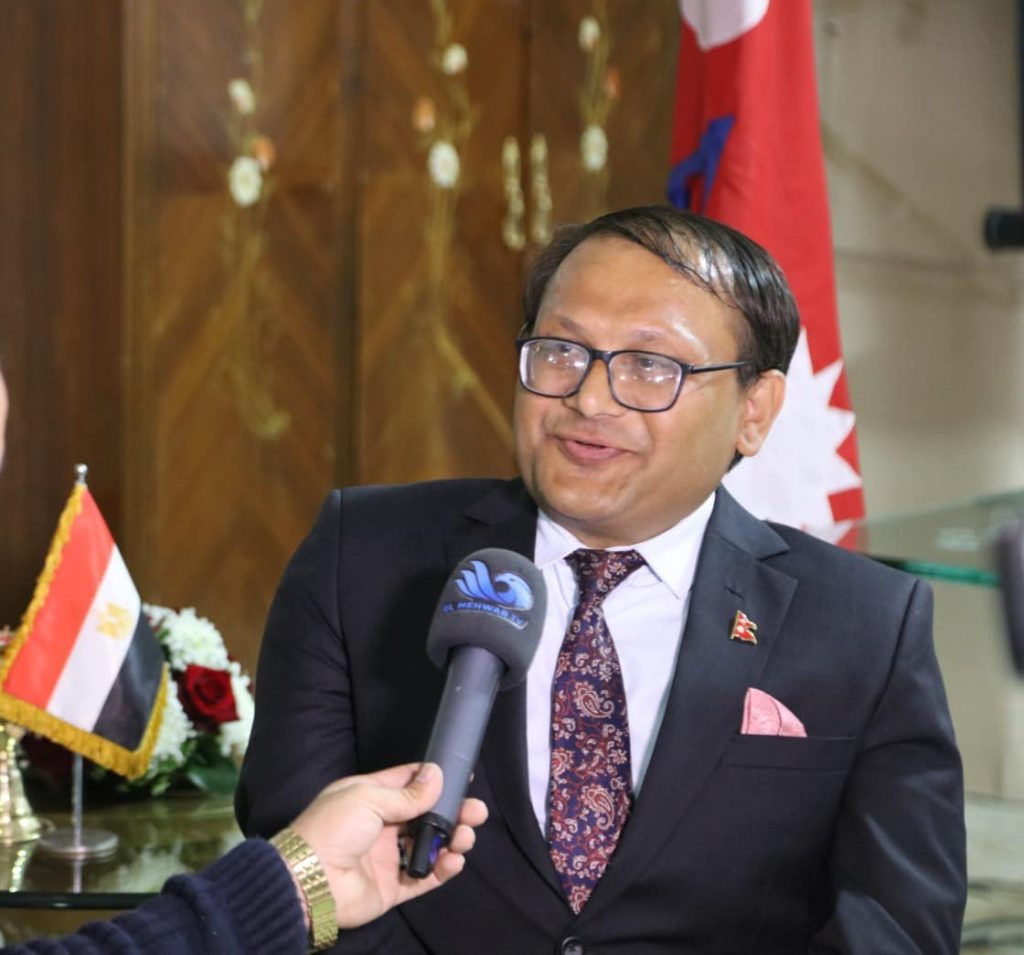
His Excellency Sushil Kumar Lamsal is regarded as one of Nepal’s finest diplomats. Ambassador Lamsal received the Excellence in Civil Service Award from the Government of Nepal in 2020. He assumed the role of Ambassador of Nepal to Egypt on August 3, 2022, and has since worked to strengthen bilateral relations between Nepal and Egypt.
In addition to his duties in Cairo, he serves as a non-resident ambassador to other countries in the region. Since joining Nepal’s Foreign Service in 2004, the seasoned diplomat has served in various missions in a range of portfolios. His international postings include Minister/Deputy Chief of Mission in Beijing (2017–2021), Counsellor and Deputy Chief of Mission in Dhaka (2014–2016), and Consul in Hong Kong (2007–2010). His tenure also includes serving as Joint Secretary in the Ministry of Foreign Affairs and as Director General of the Department of Passports (2016–17).
The Diplomat Nepal sat down with Ambassador Lamsal to gain his perspective on key issues facing Nepali diplomacy today.
Our key focus has been deepening Nepal–Egypt bilateral ties while expanding relations with the countries to which the Embassy is concurrently accredited. We have worked to enhance Nepal–Egypt engagement across diplomatic, economic, cultural, consular, and people-to-people fronts. In recent years, bilateral cooperation in trade, tourism, and education has gained notable momentum.
Safeguarding the rights and welfare of Nepali nationals through efficient and responsive consular services has remained a major priority. We have helped rescue or repatriate nationals in vulnerable situations from across the region, especially from Lebanon, Syria, Uganda, Sudan, Ethiopia, Nigeria, Morocco, Ghana, Libya, and Egypt. We have brought consular services closer to the people by organizing regular mobile passport and consular camps in countries with sizable Nepali communities, namely Jordan, Lebanon, Uganda, and Rwanda.
In the past two years, we have organized four familiarization trips to Nepal for Egyptian travel agents, influencers, and photojournalists. This has resulted in growing interest among Egyptians in Nepal as a tourist destination. We have hosted photography exhibitions, school competitions, film screenings, and art collaborations with Egyptian friends. We have reached out to universities and think tanks, supported Nepali students, and initiated diplomatic training for Nepali diplomats. We have also facilitated multiple investment-promotion events with government agencies and private-sector partners, and participated in trade expos, investment forums, and business networking events to promote Nepal’s economic potential and expand bilateral commercial linkages.
Nepal and Egypt share a longstanding friendship founded on trust, mutual respect, and cooperation, and strengthened by historical solidarity as founding members of the Non-Aligned Movement. Our bilateral cooperation continues to expand across diverse fields, particularly trade, investment, tourism, agriculture, and higher education. Nepal and Egypt share many socio-economic similarities and common aspirations for progress and prosperity. Both countries are endowed with immense tourism potential, rich natural resources, and vibrant, talented youth populations. I believe there is vast potential for mutually beneficial cooperation between Nepal and Egypt.
In recent years, the leaders of our two countries have engaged in constructive dialogue and cooperation, giving renewed momentum to our bilateral relations. In June this year, our Prime Ministers met at the UN Financing for Development Conference in Seville, Spain, and discussed ways to strengthen relations, especially in trade, investment, tourism, and education.
Prime Minister K.P. Sharma Oli extolled the historical ties between the two countries and noted that Egypt was the first African nation where Nepal established an embassy, reflecting the depth of our diplomatic relations. Egypt’s Prime Minister Mostafa Madbouly commended these longstanding ties and expressed Egypt’s keenness to strengthen bilateral cooperation. Egypt has also remained a key partner of Nepal in the region, including in ongoing efforts to secure the release of Nepali national Bipin Joshi from Gaza. Parliamentary ties have also been promoted through the establishment of the Nepal–Egypt Parliamentary Friendship Group in 2024.
In short, the foundations of Nepal–Egypt ties are strong and enduring, and, looking ahead, the two countries stand ready to build on this friendship for greater cooperation and the mutual benefit of their peoples.
In the countries of concurrent accreditation, we focus on bilateral political and diplomatic engagements, as well as crisis response and consular services for Nepali citizens. We monitor developments in war and conflict zones and maintain contact with Nepali nationals living or working in such areas. In May 2023, we assisted in evacuating Nepali nationals from Sudan during the country’s civil war. We have also provided emergency consular services and facilitated the rescue of nationals from Syria and Lebanon during crises in those countries.
In addition, we have rescued and repatriated trafficked or distressed Nepali nationals, many of them women, from conflict zones in Lebanon and Syria, as well as from Uganda, Ethiopia, Libya, and Jordan. We continue to promote Nepal’s interests in these countries, support the diaspora, and work in partnership with the NRNA and community organizations.

Nepal and Egypt both share an ancient past and a promising future. It is a great privilege to represent Nepal in Egypt at a time when both are making remarkable strides in national development and international engagement. The warmth, friendship, and generosity of the Egyptian people have made a deep impression on me. I can truly say, without exaggeration, that Egypt feels like a home away from home.
I have been fortunate to visit many remarkable places across the country, each leaving an unforgettable impression. Visiting the Luxor and Karnak Temples felt like traveling back in time to the era of the ancient Egyptians. What a magical experience it was to see the earliest recorded international peace agreement, the Treaty of Kadesh, preserved in hieroglyphs on the temple walls of Karnak!
Just like Egyptian hospitality, the country’s rich artistic and intellectual traditions are exemplary. Egyptian artists and intellectuals have always come forward to welcome and support the Embassy’s initiatives in promoting people-to-people ties. We deeply appreciate the enormous support received from Egyptian friends from all walks of life for our activities. Without their support, we would not have been able to organize the many events we have hosted in these three years — art and photography exhibitions, school exchanges, FAM trips, tea-tasting events, spring festivals, storytelling sessions, and more.
It was once thought that greater access to information and seamless communication would make diplomacy redundant. Why would you need an interlocutor if you could get the message in one click and pass it on yourself? But it turns out that greater information is not necessarily better information, and conveying a message requires nuance and context. Understanding the significance of an event or development demands a sophisticated grasp of the world. Diplomacy is about filtering out the noise to focus on the substance. Diplomacy will likely always remain relevant.
The international landscape is becoming ever more complex and interdependent, making the role of diplomacy more vital than ever. Diplomacy builds bridges and fosters trust among nation-states, peoples, and institutions. For smaller and developing countries like Nepal, it is a critical platform for advancing national interests, amplifying our voice in international forums, and building partnerships. It allows us to navigate a hyper-connected world with limited resources but meaningful influence. Through principled and proactive diplomacy, Nepal has always contributed to shaping a more just, equitable, and peaceful international order, and will continue to do so.
To aspiring young diplomats, I say:
It is a great privilege to serve as a diplomat, but it is also a solemn responsibility. A diplomat carries not only the flag of a nation but also the trust, aspirations, and dignity of its people. A diplomat must know when to speak with words and when to speak through silence, yet always ensure that the message is heard. His or her primary duty is cutting out the noise and delivering the unalloyed message. In doing so, one must remain mindful of the great march of history as well as the promise and peril of the future. Wisdom, foresight, and purpose are the hallmarks of a skilful diplomat. Building trust and fostering understanding is his or her true dharma, and truth is the only weapon.